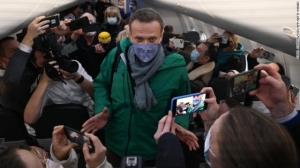Navalny Detained Upon Return to Home Russia
Russian opposition leader Alexey Navalny was detained today upon his arrival in Moscow. This was his first return to the motherland since he was poisoned last August.
Navalny was detained at passport control at Sheremetyevo Airport. He was traveling with his lawyer, who was denied a request to accompany him.
Russian authorities have said that Navalny traveled in violation of his parole and that the country’s Federal Penitentiary Service (FSIN) would seek his arrest, according to VOA reports. Russia’s prison service ordered Navalny to attend a parole hearing last month. His refusal to do so meant risking jail time for up to 3.5 years.
Operated by Russian airline Pobeda, which is owned by state-controlled Aeroflot, the plane Navalny was traveling with changed its destination from Vnukovo to Sheremetyevo Airport, two of Moscow's four airports. Supposedly, the decision to alter the landing place of the plane came as about 2,000 of Navalny's Facebook supporters said they would greet his arrival at the Vnukovo airport.
As the event had not been sanctioned by the authorities, it was illegal, according to the Moscow Prosecutor-General’s Office. As the crowd of hundreds of supporters and journalists waited for the Kremlin critic to arrive, Russian media broadcasts showed the police arresting several allies waiting at Vnukovo, including politician and lawyer Lyubov Sobol and Ruslan Shaveddinov, who works for Navalny's Anti-Corruption Foundation, according to the CNN reports.
“The question ‘to return or not’ never stood before me as I didn’t leave on my own. I ended up in Germany in an intensive care unit. On January 17, I will return home on a Pobeda flight," reads Navalny's tweet from January 13. Detained upon arrival, the only "Pobeda" (meaning victory in Russian) in his flight back home was in relation to his civil and political principles.
Five months ago, the anti-corruption activist fell ill on a flight to Moscow. During the treatment at a Siberian hospital, he was placed in an induced coma. Russian officials claimed there was no eviidence of poison entering his system and refused to investigate what happened. It was only after he was transferred to Germany that lab tests from three European countries uncovered that Navalny had been poisoned with a nerve agent of the Novichok class. The findings led the European Union to imposed sanctions on six Russian officials and a state research institute.
By Nini Dakhundaridze
Sources: VOA, CNN












